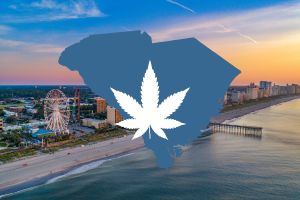Is Hemp Legal in South Carolina?
Posted by Tweedle Farms on Jan 28th 2022

Navigating the Hemp Legal Landscape in South Carolina
The evolving legal framework surrounding hemp and its derivatives, including CBD flower, CBG flower, and various other hemp-derived products, presents both opportunities and challenges in South Carolina. This article seeks to unravel the complexities of hemp legislation in the state, offering valuable insights for industry stakeholders and consumers keen on understanding the current status and implications of hemp legality.
The Legal Framework for Hemp in South Carolina
South Carolina's approach to hemp is influenced by both federal and state legislation. The 2018 Farm Bill was a watershed moment in the United States, redefining hemp as an agricultural commodity and distinguishing it from marijuana based on THC content. Hemp, defined as the Cannabis sativa L. plant and any part of the plant with a total THC concentration of not more than 0.3% on a dry weight basis, was removed from the Controlled Substances Act.
Following the federal lead, South Carolina enacted its own hemp farming legislation, establishing a framework for the cultivation, processing, and sale of hemp products within the state. This legislative environment has paved the way for a burgeoning hemp industry, with a particular focus on products like hemp flower, renowned for its low THC and high CBD content.
Distinguishing Hemp Flower, CBD Flower, CBG Flower, and THCA Flower
Understanding the distinctions between hemp flower, CBD flower, and THCA flower is crucial for navigating the legal and commercial aspects of the hemp industry. Hemp flower refers to the bud of the hemp plant, characterized by its high CBD and low THC content. CBD flower and CBG flower are essentially subsets of hemp flower, both specifically bred to maximize the content of their respective dominant cannabinoids. Both are typically used for smoking or vaping.
THCA flower introduces a more complex legal dimension. As the acidic precursor to THC, THCA is not psychoactive in its raw form. However, it can convert to THC through decarboxylation, a process triggered by heat. The potential for THCA to transform into THC complicates its legal status, making it a subject of scrutiny under state and federal laws.
The Regulatory Environment for Industry Stakeholders
For farmers, processors, retailers, and other participants in South Carolina's hemp industry, compliance with state and federal regulations is paramount. The South Carolina Department of Agriculture (SCDA) plays a critical role in overseeing the hemp program, issuing licenses and enforcing compliance with testing and reporting standards.
Key concerns for industry stakeholders include adhering to THC thresholds for hemp products and navigating the legal uncertainties surrounding smokable hemp flower. The resemblance of smokable hemp to marijuana poses challenges for law enforcement and has sparked debates over its legal status, leading to calls for clearer regulations or potential restrictions.
Consumer Awareness and Responsibility
Consumers interested in hemp-derived products, such as flower, CBD gummies, CBD oils, or even CBD topicals, bear the responsibility of ensuring the legality and safety of their purchases. It is essential to source these products from reputable vendors that provide transparent information about product testing and compliance with legal THC limits.
The ambiguous legal status of THCA flower warrants particular caution. Consumers exploring products containing THCA should be aware of the legal implications and the potential for these products to be treated similarly to THC-rich cannabis under certain conditions.
Looking Ahead: Trends and Recommendations
The hemp industry in South Carolina, like in many other states, is at a crossroads, shaped by ongoing legislative developments and market dynamics. Stakeholders should remain engaged with regulatory bodies and policymakers to advocate for clear, fair regulations that support industry growth while safeguarding public interests.
For consumers, staying informed about legal changes, understanding the distinctions between various hemp products, and practicing due diligence in product selection are essential strategies for navigating the hemp market safely and legally.
Conclusion
The legality of hemp in South Carolina, encompassing hemp flower, CBD flower, and THCA flower, is a multifaceted issue that requires careful consideration by both industry stakeholders and consumers. As the state continues to refine its hemp regulations in response to evolving federal guidelines and industry trends, the potential for growth and innovation within the sector remains significant. By fostering a collaborative approach among all involved parties, South Carolina can cultivate a thriving hemp industry that balances economic opportunities with public health and safety priorities.



